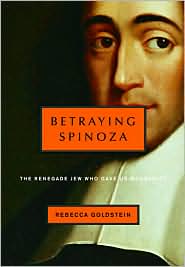 This wonderful book is neither an introduction to nor truly a biography of Spinoza. It does not put forth his system of thought in any comprehensive way. It makes little comparison between Spinoza and his contemporaries. It virtually ignores his place in philosophy from an historical viewpoint. Yet it engages the reader from its first pages and it left me wishing the book had been twice as long.
This wonderful book is neither an introduction to nor truly a biography of Spinoza. It does not put forth his system of thought in any comprehensive way. It makes little comparison between Spinoza and his contemporaries. It virtually ignores his place in philosophy from an historical viewpoint. Yet it engages the reader from its first pages and it left me wishing the book had been twice as long.The book is largely presented as a parallel memoir. Baruch "Benedict" Spinoza, a 17th Century son of the Jewish exile community of Amsterdam goes from child-prodigy to excommunicate-heretic by the time he is 23 years old. Our author learns the cautionary tale of Spinoza the "epicure" as a young girl getting a conservative Jewish education in 20th Century New Amsterdam, (i.e., NYC) only to come to be a professor of philosophy whose favorite subject is none other than Benedict the Apostate himself. The author delves deep into the backroom politics of the ex-Marrano congregations of his era. We get excursions upon kabbalah, upon the Sephardic/Ashkenazic division, upon the Messianic cult of Shabbetai Zevi. Yet more contemporary and familiar thinkers like Nietzsche and Ayn Rand are mentioned - only to be dismissed. We learn that Spinoza disagreed with Descartes - but exactly over what? Nevertheless one must sympathize with the author, any work must have its limits.
I absolutely loved and adored this book. But before reading it I had already read Spinoza in an upper level philosophy course. I had studied Latin and Greek, logic and calculus, Aristotle, Aquinas and Maimonides. I fear that anyone who approaches this title as light reading, or who doesn't already know the meaning of 'axiom', 'kherem', or 'sub specie aeternitatis' may be somewhat lost. Likewise, the initiated may be expecting something more esoteric or synthetic than they will get here.
Spinoza is not an easy subject, and if there were an easy introduction to him, he would not be what he is. My best advice would be that if you are familiar with most of the terms or people I've mentioned above, and read voraciously, then buy this book without hesitation.
No comments:
Post a Comment